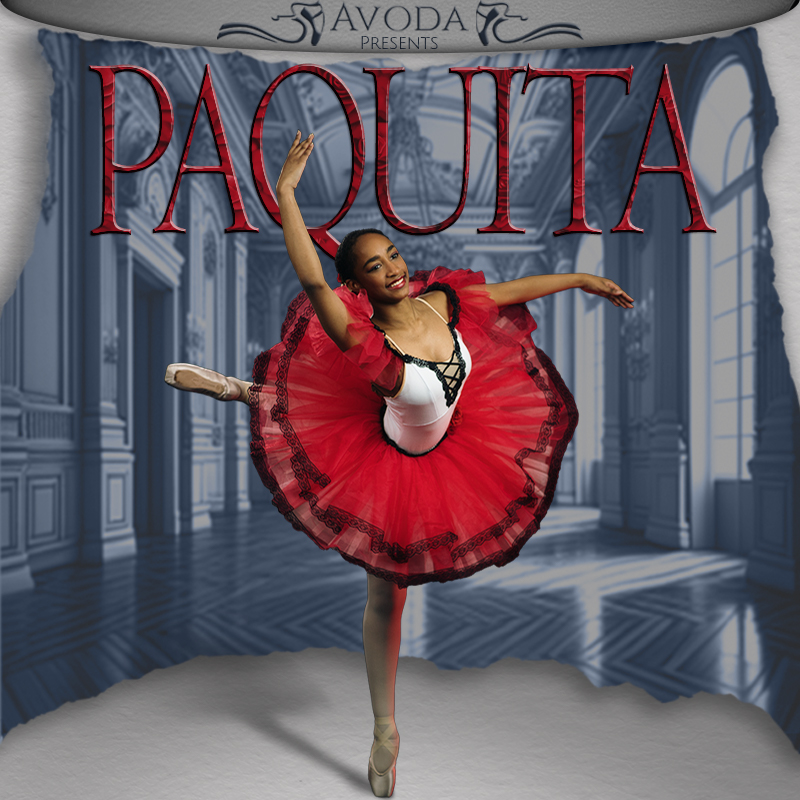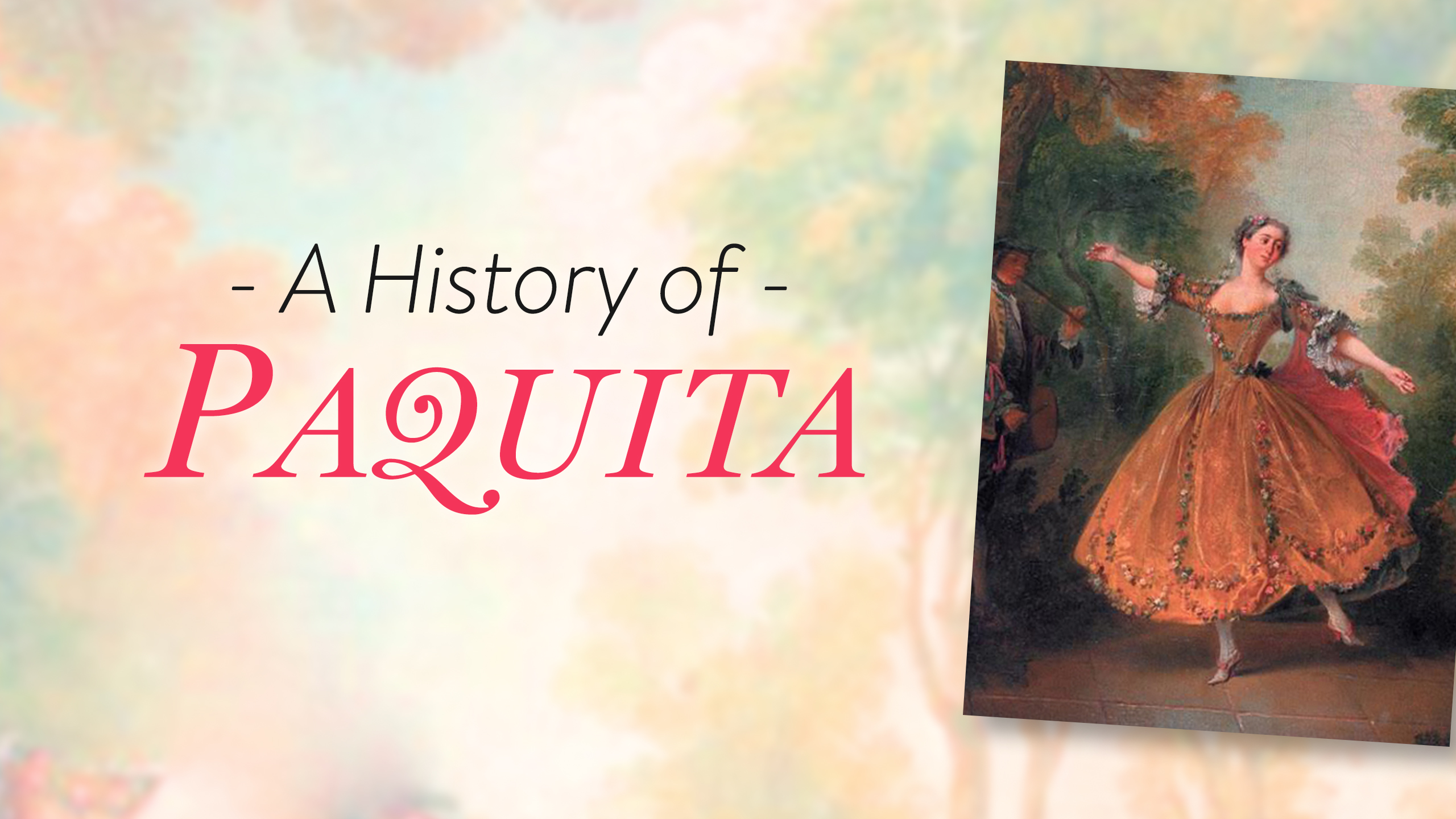Have you ever wondered what makes the name Paquita so special? It's not just a name—it's a story, a tradition, and a piece of cultural heritage. Whether you're meeting someone named Paquita for the first time or you're curious about its significance, this article will take you on a journey through its origins, meanings, and why it continues to resonate with people worldwide. So, buckle up and let's explore!
If you're like me, names carry a certain weight. They're more than just labels; they're a reflection of identity, culture, and history. Paquita is one of those names that has stood the test of time, and today, we're diving deep into everything you need to know about it. From its roots to its modern-day relevance, we'll uncover what makes Paquita such a timeless gem.
But why does Paquita matter in 2023? In an era where unique names are becoming increasingly popular, Paquita stands out as a classic that still feels fresh. It's the kind of name that evokes warmth, tradition, and a sense of belonging. By the end of this article, you'll have a newfound appreciation for this iconic name and how it fits into the broader tapestry of global culture. Let's get started!
Read also:Christina Aguilera Takes Her Kids To Disneyland For A Magical Weekend
Understanding the Roots of Paquita
Where Does Paquita Come From?
Alright, let's start with the basics. Paquita is a diminutive form of the name Francisca, which is the feminine version of Francisco. It originated in Spain and has deep roots in Latin American cultures as well. The name Francisca itself comes from the Latin word "Franciscus," meaning "Frenchman." So, in essence, Paquita is a nickname that carries a rich historical and cultural significance.
What makes Paquita stand out is its use as both a given name and a nickname. In many Spanish-speaking countries, it's common to use diminutives to show affection or familiarity. Paquita is one of those names that instantly conveys warmth and friendliness. It's not just a name—it's a way of life!
Paquita Across Cultures
While Paquita is most commonly associated with Spanish and Latin American cultures, its influence extends far beyond those borders. Over the years, it has found its way into various languages and traditions, adapting to different contexts while retaining its core identity.
- In Spain, Paquita is often seen as a traditional name with strong familial ties.
- In Latin America, it's embraced as a symbol of warmth and community.
- In the U.S., Paquita has gained popularity among Hispanic communities, blending old-world charm with modern flair.
What's fascinating is how Paquita has managed to maintain its relevance across generations. It's not just a name—it's a bridge between the past and the present, connecting people through shared heritage and values.
The Meaning Behind Paquita
What Does Paquita Symbolize?
Names often carry symbolic meanings, and Paquita is no exception. At its core, Paquita represents strength, resilience, and grace. It's a name that speaks to the power of femininity and the importance of tradition. In many cultures, Paquita is seen as a name that embodies kindness, compassion, and a deep sense of family loyalty.
But let's not forget the playful side of Paquita. As a diminutive, it carries a sense of lightness and joy. It's the kind of name that makes you smile when you hear it, and that's part of its charm. Whether you're meeting someone named Paquita for the first time or you've known her for years, the name instantly creates a connection.
Read also:Prince Harry And Meghan Markles New Life In Canada Plans For Archies Upbringing
Paquita in Literature and Media
Throughout history, Paquita has made appearances in literature, music, and film, cementing its place in popular culture. One of the most famous examples is "Paquita," a ballet created by Joseph Mazilier in the 19th century. This ballet tells the story of a young woman named Paquita who navigates love, adventure, and self-discovery—a narrative that resonates with audiences even today.
In modern media, Paquita continues to inspire. From songs to novels, the name has been used to evoke emotions and tell compelling stories. It's a testament to its enduring appeal and the universal themes it represents.
Paquita in Modern Times
Why Is Paquita Still Relevant Today?
In an age where unique names are all the rage, Paquita remains a timeless classic. It's the perfect balance of tradition and modernity, making it appealing to parents who want a name that's both familiar and distinctive. Its popularity has seen a resurgence in recent years, with more and more people embracing its charm and history.
According to data from the Social Security Administration, Paquita has consistently ranked among the top names in Hispanic communities in the U.S. While it may not be as common as some other names, its steady presence speaks volumes about its lasting appeal. It's the kind of name that feels special without being overly trendy.
Paquita and Identity
Names play a crucial role in shaping identity, and Paquita is no exception. For many, it represents a connection to their roots and a sense of belonging. In a world that often emphasizes individuality, Paquita reminds us of the importance of community and shared heritage.
Moreover, Paquita is a name that transcends borders. Whether you're in Madrid, Mexico City, or Miami, Paquita carries a universal appeal that resonates with people from all walks of life. It's a name that unites rather than divides, and that's what makes it so special.
The Popularity of Paquita
Paquita Through the Years
Let's take a trip down memory lane and explore how Paquita has evolved over the years. In the early 20th century, Paquita was a common name in Spain and Latin America, often associated with traditional values and family-oriented lifestyles. As globalization took hold, the name began to gain traction in other parts of the world, particularly in the U.S.
Today, Paquita continues to thrive, albeit in a slightly different context. While it may not be as widespread as some other names, its popularity has remained steady, thanks in part to its timeless appeal and cultural significance. It's the kind of name that feels both classic and contemporary, making it a favorite among parents who value tradition.
Paquita and Generational Differences
Interestingly, Paquita is one of those names that bridges generational gaps. Older generations may associate it with nostalgia and fond memories, while younger generations see it as a way to honor their heritage. This duality is part of what makes Paquita so unique—it appeals to people of all ages and backgrounds.
For instance, in Latin American communities, Paquita is often seen as a name that connects the old world with the new. It's a way of paying homage to one's ancestors while embracing the opportunities of the present. This dual identity is what keeps Paquita relevant in today's fast-changing world.
Paquita in Popular Culture
Paquita in Music
Music has long been a vehicle for storytelling, and Paquita has found its way into numerous songs over the years. From traditional folk songs to modern pop hits, the name has been used to evoke emotions and tell compelling stories. One notable example is the song "Paquita" by Mexican singer-songwriter Chavela Vargas, which beautifully captures the essence of the name.
What makes Paquita so appealing in music is its ability to convey complex emotions in a simple yet powerful way. Whether it's love, longing, or joy, the name resonates with listeners on a deep level. It's no wonder that so many artists have chosen to incorporate it into their work.
Paquita in Film and Television
Paquita has also made its mark in the world of film and television. From classic movies to modern TV shows, the name has been used to create memorable characters that leave a lasting impression. One standout example is the character Paquita in the Spanish film "Paquita Salas," a comedy that explores themes of identity and self-discovery.
What these portrayals show is how versatile and adaptable the name Paquita is. Whether it's used to tell a lighthearted story or a more serious narrative, it always manages to capture the audience's attention. It's a testament to its enduring appeal and the universal themes it represents.
The Future of Paquita
Paquita in the Digital Age
As we move further into the digital age, Paquita continues to evolve. Social media platforms like Instagram and TikTok have become fertile ground for sharing stories and celebrating cultural heritage, and Paquita is no exception. Hashtags like #PaquitaPride and #PaquitaPower have gained traction, showcasing the name's continued relevance in today's world.
What's exciting is how Paquita is being reimagined for a new generation. Young people are using the name to express themselves and connect with others who share their values. It's a name that feels both familiar and fresh, making it a perfect fit for the digital age.
Paquita and Globalization
With globalization continuing to reshape the world, Paquita is poised to become even more popular. As more people embrace their cultural heritage while living in diverse societies, names like Paquita will continue to resonate. It's a name that transcends borders and speaks to the universal human experience.
Moreover, Paquita's adaptability makes it a great choice for parents who want a name that's both meaningful and easy to pronounce. Whether you're in Madrid, Mexico City, or Miami, Paquita carries a sense of warmth and familiarity that makes it instantly recognizable.
Conclusion: Celebrating Paquita
As we've explored in this article, Paquita is more than just a name—it's a story, a tradition, and a piece of cultural heritage. From its roots in Spain to its modern-day relevance, Paquita continues to inspire and connect people across the globe. Its timeless appeal and adaptability make it a favorite among parents who value tradition and individuality.
So, whether you're meeting someone named Paquita for the first time or you're considering it as a name for your own child, remember that it carries with it a rich history and a deep sense of identity. And if you enjoyed this article, don't forget to share it with your friends and family. Together, let's celebrate the beauty and significance of Paquita!
Table of Contents


